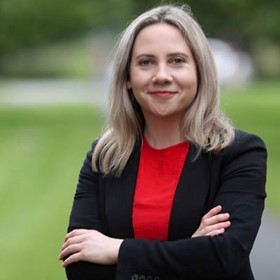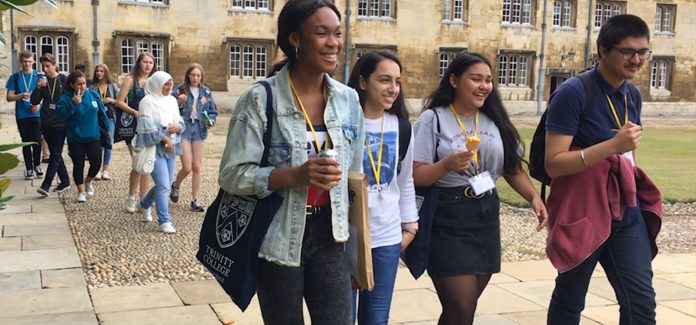Ron Ragsdale in conversation with Laura Harmon
You’ve led a very politically charged life, twice running for a seat in the Seanad, as well as holding critical roles in the Labour party and the Union of Students in Ireland. What led you to take such a public career path and what motivates you now? Will you run again for the Seanad?
I got involved in political activism and campaigning when I was a student at University College Cork. Through the students’ union there, I got involved in a range of campaigns, including education equality, student mental health and human rights. This led me to become politically active.
I have no intention currently to run for election any time soon and I am really enjoying my new role as executive director of the Irish Council for International Students (ICOS). I’m motivated by campaigning for equality and there are many hurdles in relation to this in the higher education sector.
You have an MA in Applied Linguistics, which is often a professional route into English language teaching. In fact, in this issue of the Gazette, we will be publishing our annual listing of ELT-related MA programmes across the UK and Ireland – which of course includes University College Cork. Have you ever taught English or Gaelic? And if not, what was your intent when doing the MA?
I’ve always been interested in languages, and I received my primary and secondary education through the Irish language. I’ve tutored secondary school students in Irish and English, but I have never taught English to anyone who was learning it for the first time.
I’ve also done some translation work in the past when I was a student. I considered travelling abroad to teach English, but my career took me elsewhere and I’m really pleased to be working in the education sector with a fantastic team.
Your political activism has focused on the rights of groups marginalised by mainstream society or politics, but you are now in a role focusing on students, many of whom are international students in Ireland – do you see this as a group needing advocacy? How are international students treated in Ireland and what do you feel should change?
Overall, international students are treated well in Ireland and I know that colleges have been working hard to support them during Covid-19. However, mental health supports, insurance costs and accommodation are all issues affecting international students.
We need to ensure that Ireland implements the International Education Mark to guarantee course quality. ICOS also campaigns on the regulation of online classes, and ICOS regularly consults with international students so that our campaigns are reflective of their needs.

Ireland has the biggest EFL industry per capita in the English-speaking world, but the smallest number of international students in its universities. Why? Irish schools often tell me it’s because they are so small, but Scotland is only about 10% bigger and 20% of all its university students are international. Do you think there are problems with racism that puts international students off from studying in Ireland? Or is it a lack of work rights?
The USA, UK, Canada and Australia have the largest international student numbers in the world, and given that Scotland is part of the UK, it is unfair to draw comparisons between Scotland and Ireland. It is worth noting that according to the ERSI, non-EEA international student numbers in Ireland grew by 45% between 2013-2017, and this trend will likely continue, depending on Covid-19.
“ICOS has continuously voiced its concerns over the lack of regulations and quality assurances in the delivery of online English language classes”
Racism exists in all the countries above, including Ireland, but we don’t believe that’s a reason people choose not to come here.
Ireland has attractive student working entitlements in comparison to places like the UK or USA, so this is definitely an attributing factor for the increase in international students choosing to study in this country.
Although you are focused on students’ rights, educational outcomes are often tied closely to how teachers are treated. What are your views on the teachers’ rights movement in Ireland and unionisation, and how does this affect educational outcomes for students?
ICOS believes that teachers should have good standards of employment and security in their contracts. I think it’s important that teachers’ unions are active in the third level sector. I believe teachers can only benefit from joining a union, so hat they can be aware of their rights and campaign collectively when needed.
We reported recently that language students in Ireland, who have completed the maximum two years permitted, may remain as students until the end of the year provided they re-enrol in an online course of study for the remainder of the year. However, there were concerns that students were being mandated to enrol in classes, many of which were not fit for purpose. What is the current situation and will you be campaigning for further improvements?
ICOS has continuously voiced its concerns over the lack of regulations and quality assurances in the delivery of online English language classes. While it is our understanding that many language schools are doing their best to offer high-quality English classes, there are schools that are not, and this is why ICOS has been calling on the Irish government to regulate online classes.
Because of Covid-related travel restrictions, many of the language schools in Ireland have closed, putting teachers’ jobs at risk, particularly those on zero-hours contracts. We recently featured a column by one frank Irish teacher, berating the state of the industry, even before the chaos of coronavirus (elgazette.com/elg_archive/ ELG1902/mobile/index.html#p=36). Is this something that you have views on or that ICOS would advocate for?
This year has been an extremely difficult time for all involved in the ELT sector – students, teachers and their schools. ICOS believes that English language teachers should be treated and paid fairly for their work, as they are the life and blood of English language schools. We welcome their inclusion on the government’s ELT Covid-19 Working Group, where issues relating to the sector are discussed.
Finally, what three things would you say are the biggest challenges right now for English language teaching and learning in Ireland, and what can ICOS do to help address them?
Covid-19 is obviously the biggest current challenge. The health and safety concerns for face-to-face teaching, even when adequate measures have been taken by schools, are a cause of stress for international students.
Until a vaccine for Covid-19 has been universally rolled out, there will be continued disruptions to international travel, which will ultimately see the sector continue to struggle.
As discussed earlier, there is an urgent need for online classes to be regulated to ensure that international students’ rights are protected and that rogue schools are held accountable. ICOS will continue to campaign on this issue.
In October, insurance premiums for international students who have lived in Ireland for one year or more increased significantly – up to 450% in some cases. This is of great concern to ICOS, as it is unfair on international students and will likely have negative repercussions for the sector, which is why ICOS is campaigning for the increase to be overturn.

Laura Harmon
is the recently appointed executive director of ICOS (Irish Council for International Students). Laura is a former president of the Union of Students Ireland, as well as a former board member of ICOS and the Higher Education Authority. She has worked on many equality campaigns in Ireland, including for marriage equality, and she was head of Mobilisation for Together for Yes. Prior to commencing her new role at ICOS, Laura worked as Women in Leadership coordinator at the National Women’s Council and was an Independent Seanad NUI candidate in 2016 and 2020.





